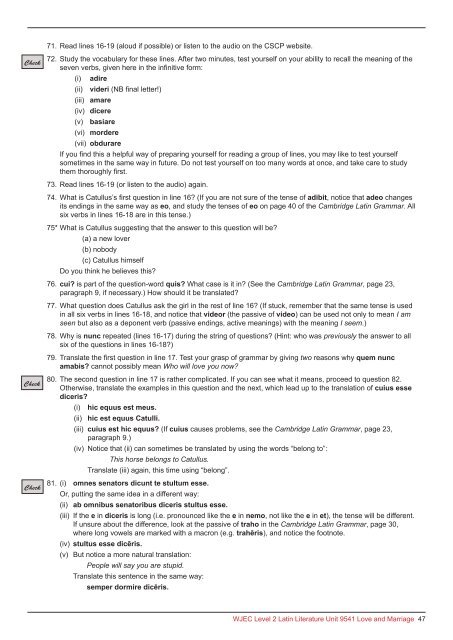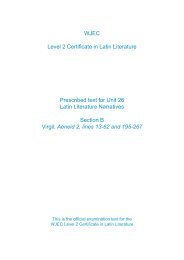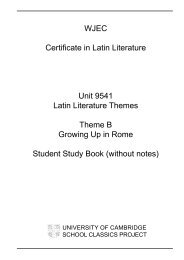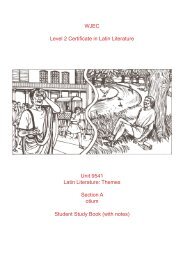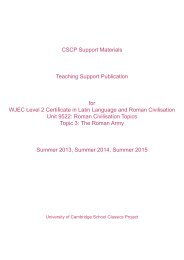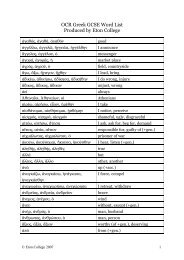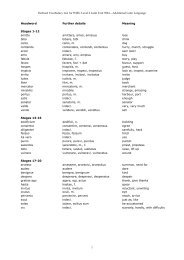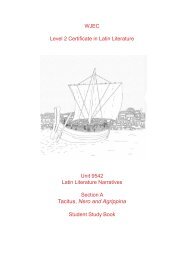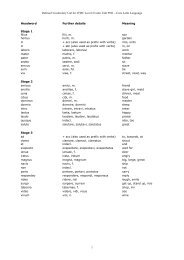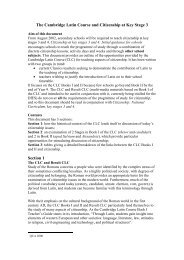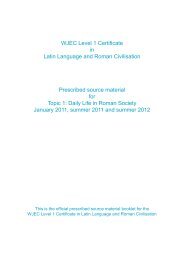2. Student Study Book - Cambridge School Classics Project
2. Student Study Book - Cambridge School Classics Project
2. Student Study Book - Cambridge School Classics Project
Create successful ePaper yourself
Turn your PDF publications into a flip-book with our unique Google optimized e-Paper software.
71. Read lines 16-19 (aloud if possible) or listen to the audio on the CSCP website.CheckCheckCheck7<strong>2.</strong> <strong>Study</strong> the vocabulary for these lines. After two minutes, test yourself on your ability to recall the meaning of theseven verbs, given here in the infinitive form:(i)adire(ii) videri (NB final letter!)(iii) amare(iv) dicere(v) basiare(vi) mordere(vii) obdurareIf you find this a helpful way of preparing yourself for reading a group of lines, you may like to test yourselfsometimes in the same way in future. Do not test yourself on too many words at once, and take care to studythem thoroughly first.73. Read lines 16-19 (or listen to the audio) again.74. What is Catullus’s first question in line 16? (If you are not sure of the tense of adibit, notice that adeo changesits endings in the same way as eo, and study the tenses of eo on page 40 of the <strong>Cambridge</strong> Latin Grammar. Allsix verbs in lines 16-18 are in this tense.)75* What is Catullus suggesting that the answer to this question will be?(a) a new lover(b) nobody(c) Catullus himselfDo you think he believes this?76. cui? is part of the question-word quis? What case is it in? (See the <strong>Cambridge</strong> Latin Grammar, page 23,paragraph 9, if necessary.) How should it be translated?77. What question does Catullus ask the girl in the rest of line 16? (If stuck, remember that the same tense is usedin all six verbs in lines 16-18, and notice that videor (the passive of video) can be used not only to mean I amseen but also as a deponent verb (passive endings, active meanings) with the meaning I seem.)78. Why is nunc repeated (lines 16-17) during the string of questions? (Hint: who was previously the answer to allsix of the questions in lines 16-18?)79. Translate the first question in line 17. Test your grasp of grammar by giving two reasons why quem nuncamabis? cannot possibly mean Who will love you now?80. The second question in line 17 is rather complicated. If you can see what it means, proceed to question 8<strong>2.</strong>Otherwise, translate the examples in this question and the next, which lead up to the translation of cuius essediceris?(i) hic equus est meus.(ii) hic est equus Catulli.(iii) cuius est hic equus? (If cuius causes problems, see the <strong>Cambridge</strong> Latin Grammar, page 23,paragraph 9.)(iv) Notice that (ii) can sometimes be translated by using the words “belong to”:This horse belongs to Catullus.Translate (iii) again, this time using “belong”.81. (i) omnes senators dicunt te stultum esse.Or, putting the same idea in a different way:(ii) ab omnibus senatoribus diceris stultus esse.(iii) If the e in diceris is long (i.e. pronounced like the e in nemo, not like the e in et), the tense will be different.If unsure about the difference, look at the passive of traho in the <strong>Cambridge</strong> Latin Grammar, page 30,where long vowels are marked with a macron (e.g. trahēris), and notice the footnote.(iv) stultus esse dicēris.(v) But notice a more natural translation:People will say you are stupid.Translate this sentence in the same way:semper dormire dicēris.WJEC Level 2 Latin Literature Unit 9541 Love and Marriage 47


